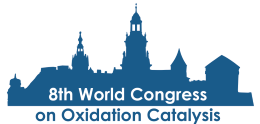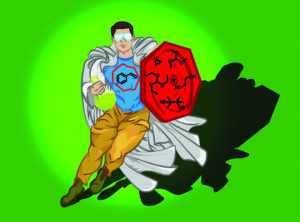As featured on the front cover of Green Chemistry Issue 17, Dr Vinh Nguyen tells us a little more about the artwork: “This graphic features a “superchemist” in safety goggles and white labcoat/cape holding a round-bottom flask. He is holding a heptagonal shield representing our tropylium ion. There are engravings on the shield denoting what chemicals can be used to protect the “carbonyl compound” on his chest.”
Archive for August, 2017
8th World Congress on Oxidation Catalysis
 The 8th World Congress on Oxidation Catalysis will be held in Krakow, Poland from the 3rd – 8th September 2017. WCOC 2017 follows the series of meetings devoted to oxidation catalysis, which are organized every four years and have became the forum for researchers in the field of selective oxidation and oxide catalysts to gather and discuss new challenges and advances in these fields, as well as to generate new contacts and collaborations.
The 8th World Congress on Oxidation Catalysis will be held in Krakow, Poland from the 3rd – 8th September 2017. WCOC 2017 follows the series of meetings devoted to oxidation catalysis, which are organized every four years and have became the forum for researchers in the field of selective oxidation and oxide catalysts to gather and discuss new challenges and advances in these fields, as well as to generate new contacts and collaborations.
Catalysis Science & Technology, Physical Chemistry Chemical Physics (PCCP), Green Chemistry and Reaction Chemistry & Engineering are delighted to be supporting the event.
Green Chemistry publishes: a new way to remove 99% of harmful BPA from water
Green Chemistry Review gains worldwide press coverage.
An international team of scientists have designed a water treatment system that can remove the harmful chemical BPA from water with 99% effectiveness – as published in Green Chemistry.
Dr Matthew DeNardo, one of the review‘s authors and the primary author of the BPA sections tells us about how the work came together:
The Institute for Green Science at Carnegie Mellon University, which is led by Terrence J. Collins, the Teresa Heinz Professor of Green Chemistry, focuses on the multidisciplinary development of TAML processes for the removal of endocrine disruptors from waters. Production of this authentic, high-quality work, requires engagement of the many fields necessary to direct chemistry towards sustainability. For example, this manuscript would not have been possible without significant contributions from The Department of Environmental and Molecular Toxicology at Oregon State University and both The Department of Civil & Environmental Engineering and Centre for Green Chemical Science at the University of Auckland.
The mini-reviews, which Dr. Collins and I wrote together, unify the findings of several disciplines concisely to illuminate the emergent truths. It is fitting that this ‘level of thought’ is necessary to both demonstrate the massive challenge facing the chemical enterprise and the path towards better chemical design and stewardship. Composing these sections, which was both necessary and right, was met with generous financial and moral support, an all-too-rare response for which I will be ever-grateful to Dr. Collins and the Heinz Endowments. I am also deeply indebted to all of the authors for their efforts and patience.
Read the original Green Chemistry publication here.
Find out more about the breakthrough from science outlets including Environmental Health News, Phys.org, New Scientist and RSC News.












